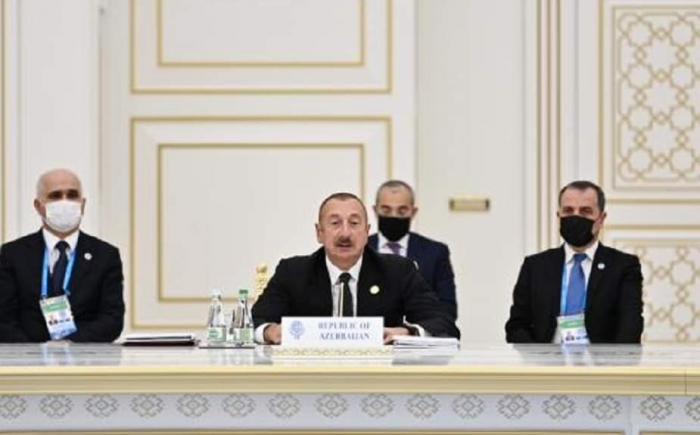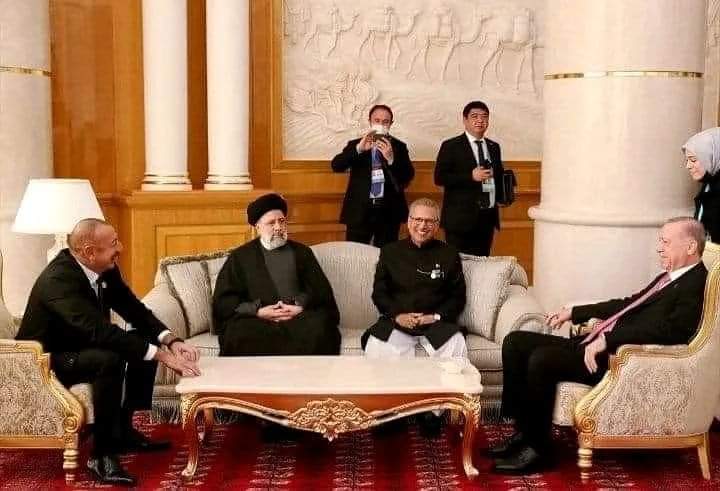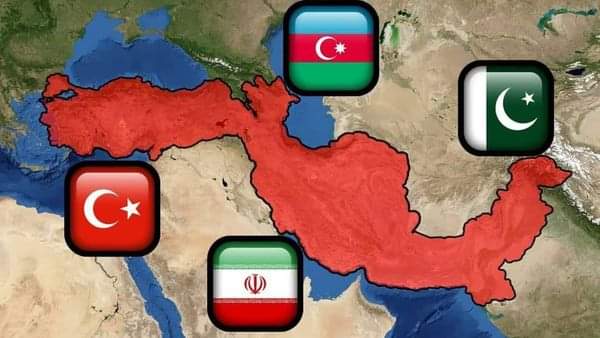ANALYTICS
29.11.21 10:00

Shortly after the meeting in Sochi, where a joint declaration by the heads of Azerbaijan, Armenia and Russia announced the unblocking of communications, an Economic Cooperation Organisation (ECO) summit was held in Ashgabat, where the Zangezur corridor was essentially presented to the countries.
Let's remind that the ECO members are Afghanistan, Azerbaijan, Iran, Kazakhstan, Kyrgyzstan, Pakistan, Tajikistan, Turkey, Turkmenistan, Uzbekistan. As Iranian President Ebrahim Raisi noted in his speech at the summit, the ECO countries with a combined population of 500 million people, while possessing one-third of the world's energy resources.
For a while the issue of secure delivery of resources to other parts of the world has been a ECO problem. However, the creation of new transit corridors and the unblocking of communications will successfully solve it.
The main event of the summit was that Azerbaijani President Ilham Aliyev essentially "presented" the Zangezur transport corridor.
"Today I can say that the Zangezur corridor turns into reality. This new transport infrastructure will be an important part of the East-West and North-South corridors," Ilham Aliyev said Sunday, 28 November 2021, speaking in Ashgabat at the 15th summit of the leaders of the Economic Cooperation Organization (ECO) member countries.
Ilham Aliyev expressed confidence that the ECO countries will take advantage of the Zangezur corridor.
"At the last summit of the Economic Cooperation Organization, I informed my colleagues about the Zangezur corridor. Today I can say that the Zangezur Corridor is becoming a reality. This new transport infrastructure will become an important part of the East-West and North-South corridors. I am confident that the ECO member countries will use this corridor," the President of Azerbaijan stated, stressing that the country's authorities are currently carrying out large-scale rehabilitation work in Karabakh and Eastern Zangezur, liberated from Armenian occupation as a result of the 44-day war with Armenia in autumn 2020.
"During the occupation, all the towns and villages in these territories were destroyed. (...) We have started large-scale works to restore the liberated territories, there are primary results. All these works are financed by the government of Azerbaijan. In 2021, $1.3 billion from the state budget was allocated for this purpose, and in 2022 at least the same amount will be allocated", the head of Azerbaijan said.
Along with other new transport projects in Eurasia, Zangezur corridor was mentioned by Turkish President Recep Tayyip Erdogan in his speech at the ECO summit in Ashgabat. He said the projects will, at the first stage, connect more than 500 million people of a number of countries with a total area of 8 million sq. km and generate a trade turnover of more than $100 billion. At the next stage, Russia and China will be connected, which will increase all of the above figures several times.
The Zangezur corridor is necessary to the states not only of Central Asia. Iran could also be economically interested in the corridor.
It is obvious that if Iran had not paid lip service to hypocrisy, but had actually defended Muslims and Islamic values, it should have welcomed the liberation of Karabakh more than anyone else. It is not by chance that Ilham Aliyev made the following statement:
"...During the occupation, Armenia razed to the ground all towns and villages in these territories, including cultural and religious heritage monuments. On the grounds of insult and hatred towards all Muslims, Armenia destroyed and desecrated all the mosques, even using them as pig and cow cowsheds. During the occupation, 65 of the 67 mosques in these territories were completely destroyed and the remaining two mosques were severely damaged. The cemeteries were also vandalised..."
However, as we have seen from Tehran's cooperation with Yerevan and Armenian nationalists, despite the declarations "spiritual issues" really do not interest the leadership of the Islamic Republic of Iran much. However, the Iranian authorities try to take economic issues into account everywhere and do not miss out on their benefits.

Iran faces economic and political difficulties. There have recently been further protests over unprecedented drought and water shortages. The country's agriculture is suffering and thousands of farmers are going bankrupt. Whereas earlier protests over water scarcity took place in the Arab-populated province of Khuzestan, now the "most Persian" province of Isfahan has been overrun by farmers' protests.
Thousands of Isfahan residents marched to the dried-up Zayande riverbed to support farmers and express their outrage over the state of the river, which has dried up due to drought and poor management of water distribution. Last Thursday, police in Isfahan city used force against demonstrators protesting against the government's water management policy.
Obviously, the Iranian authorities will need to take measures to support drought-affected agriculture at the very least. The economy will be under additional strain, and it will be difficult to solve the problem without increasing exports of Iranian goods and finding new markets.
The Zangezur corridor will increase the transit of goods from Central Asia through Iran by land. This transit could have huge prospects, and it is objectively beneficial to the authorities in Tehran.
Iran needs to realize that the logic of confrontation and support needs to shift to cooperation in the region. The opening of the Zangezur corridor increases the possibilities of diversifying the flow of goods for all ECO countries. In order to get direct overland access via Azerbaijan and Zangezur to Turkey and further to European countries, they can choose their routes. Three options emerge:
1. Directly across the Caspian, then through Azerbaijan to Turkey
2. Through Russia, which through the Zangezur corridor receives direct rail and road connections through Azerbaijan to Turkey
3. through the territory of Iran, Azerbaijan and Turkey.
All this will inevitably bring about an increase in economic activity in the region, making the transport of goods and resources from east to west and backwards profitable. The Zangezur corridor also complements other transit routes, giving Russia direct access to the Persian Gulf and the Indian Ocean via Azerbaijan and Iran in a north-south direction.

In addition, all ECO countries can participate in programmes to rehabilitate Azerbaijan's liberated territories. Including Iran, for which cooperation with Azerbaijan is objectively much more profitable than with poor Armenia. Especially in the situation it was in until recently, having artificially driven itself into a blockade and confrontation with its neighbours.
It is no coincidence that in his speech at the ECO summit the Iranian president noted:
"The end of enmity in the Caucasus signifies the beginning of a new period of solidarity in the region. It is our common duty to work in this direction. Any changes in the political geography of the region will create grounds for increased tensions in the future. Cooperation of the countries of the Caucasus will ensure stability, peace and development of the countries of the region in accordance with the principle of mutual respect and protection of territorial integrity".
The fact that the head of Iran mentioned the protection of territorial integrity is a very significant moment.
Iran's inclusion in the cooperation and transit regions within the ECO framework completely knocks the ground out from under the feet of political speculators, who shout that the Zangezur corridor is the way to the notorious "Great Turan.
Iran has absolutely nothing to do with "The Great Turan", but objectively it is very interested in cooperation with Turkish countries. Not to mention the fact that Turks, according to some data, constitute up to a half of Iran's population, first of all Azerbaijanis. Therefore, if Iran is in the projects, the political speculators among the Armenian nationalists will no longer be able to frighten either their public or Russia with "Great Turan".
Kavkazplus
Read: 541
Write comment
(In their comments, readers should avoid expressing religious, racial and national discrimination, not use offensive and derogatory expressions, as well as appeals that are contrary to the law)
News feed
-
Defense Committee Chair hosts Head of NATO Liaison Office in Georgia
12:3025.04.24
-
11:5725.04.24
-
11:1125.04.24
-
Rally against draft law "On Transparency of Foreign Influence" underway near Parliament
10:0025.04.24
-
MIA to identify individuals calling for blocking roads artificially during Rustaveli Avenue rallies
18:0024.04.24
-
Lazare Grigoriadis leaves prison
17:3024.04.24
-
Irakli Kobakhidze to participate in the Conservative Political Action Conference in Hungary
17:0024.04.24
-
16:1724.04.24
-
15:3024.04.24
-
Youth social entrepreneurship support project kicks off
14:5024.04.24
-
14:0024.04.24
-
Tbilisi Mayor deems new stadium construction as a mega project
13:2024.04.24
-
12:2424.04.24
-
Rustavi City Council Chairman dismissed
11:3024.04.24
-
10:2224.04.24
-
9:0024.04.24
-
Tusheti Protected Landscape in Georgia’s north-east to expand by 2,245 hectares
18:0023.04.24
-
17:2823.04.24
-
16:5623.04.24
-
16:2023.04.24
-
15:4423.04.24
-
15:0623.04.24
-
Georgian PM, UN representatives review cooperation
14:3523.04.24
-
14:0023.04.24
-
Four people were arrested for making and issuing fake driving licenses
13:2023.04.24
-
12:3923.04.24
-
Georgian, Croatian foreign ministers discuss “fruitful” cooperation
11:3023.04.24
-
Georgian foreign office welcomes border delimitation deal between Armenia, Azerbaijan
10:4523.04.24
-
10:0023.04.24
-
8:0023.04.24
-
18:0022.04.24
-
Prosecutor's Office arrests organized criminal group members involved in call centres
17:2722.04.24
-
Economy Minister: Georgian economy to become “one of fastest-growing” in Europe, wider region
16:5522.04.24
-
Deputy Economy Minister: over million travellers, “record-high” EU visitors entered Georgia in Q1
16:3122.04.24
-
Girchi Party sceptical about their Political Lobbying bill's support in Parliament
16:0022.04.24
-
Russian occupation forces illegally arrest two citizens of Georgia near village of Dirbi
15:3022.04.24


